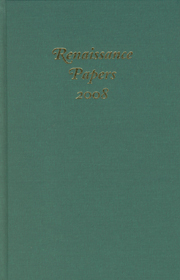Book contents
- Frontmatter
- Contents
- Renaissance Papers
- Cardinal Wolsey: The English Cardinal Italianate
- Pope Gregory and the Gens Anglorum: Thomas Stapleton's Translation of Bede
- The Spenserian Paradox of Intended Response
- Lucan, Marlowe, and the Poetics of Violence
- Hell Is Discovered
- Private and Public Plays in the Private Theaters: Speculation on the Mercenary Methods of Second Paul's and Second Blackfriars
- Staging Dismemberment in Early Modern Drama: Playing Mnemonics and Meaning
- Serving Theater in Volpone
- Troilus and Cressida: An Epitaph for the History Play
- “What thing thou art, thus double-formed”: Naming, Knowledge, and Materialism in Paradise Lost
Serving Theater in Volpone
Published online by Cambridge University Press: 12 September 2012
- Frontmatter
- Contents
- Renaissance Papers
- Cardinal Wolsey: The English Cardinal Italianate
- Pope Gregory and the Gens Anglorum: Thomas Stapleton's Translation of Bede
- The Spenserian Paradox of Intended Response
- Lucan, Marlowe, and the Poetics of Violence
- Hell Is Discovered
- Private and Public Plays in the Private Theaters: Speculation on the Mercenary Methods of Second Paul's and Second Blackfriars
- Staging Dismemberment in Early Modern Drama: Playing Mnemonics and Meaning
- Serving Theater in Volpone
- Troilus and Cressida: An Epitaph for the History Play
- “What thing thou art, thus double-formed”: Naming, Knowledge, and Materialism in Paradise Lost
Summary
BY the time Ben Jonson had published Volpone in 1607, theatrical patronage was beginning to wane in importance, while the enterprise of commercial theater was firmly establishing itself as a professional activity rather than a vaguely servile one. The rise in prestige that playing companies enjoyed from securing aristocratic (and sometimes royal) patronage contributed to the theater's growing commercial viability. Paradoxically, as theater companies became officially more subservient, they became in reality more independent. As Roslyn Knutson explains, “there was a transition of companies from loosely organized groups of common players to relatively stable companies under the banner of a lord, a transition that … coincided with a shift from troupes with discrete economic existences to companies with a shared commercial agenda.” Jonson was acutely aware of, dependent upon, and by turns thankful for and resentful of both the constraints of patronage and the public's fickle favor. In Volpone, however, he lays bare the theatricality of authority and servitude in a way that exceeds the concerns of theatrical patronage. The relentlessly metatheatrical nature of Volpone calls our attention to how the play analogizes the changing dynamic between patronage and theater as a charged relationship between masters and servants, just as it links servitude with theatricality.
- Type
- Chapter
- Information
- Renaissance Papers 2008 , pp. 125 - 136Publisher: Boydell & BrewerPrint publication year: 2009



